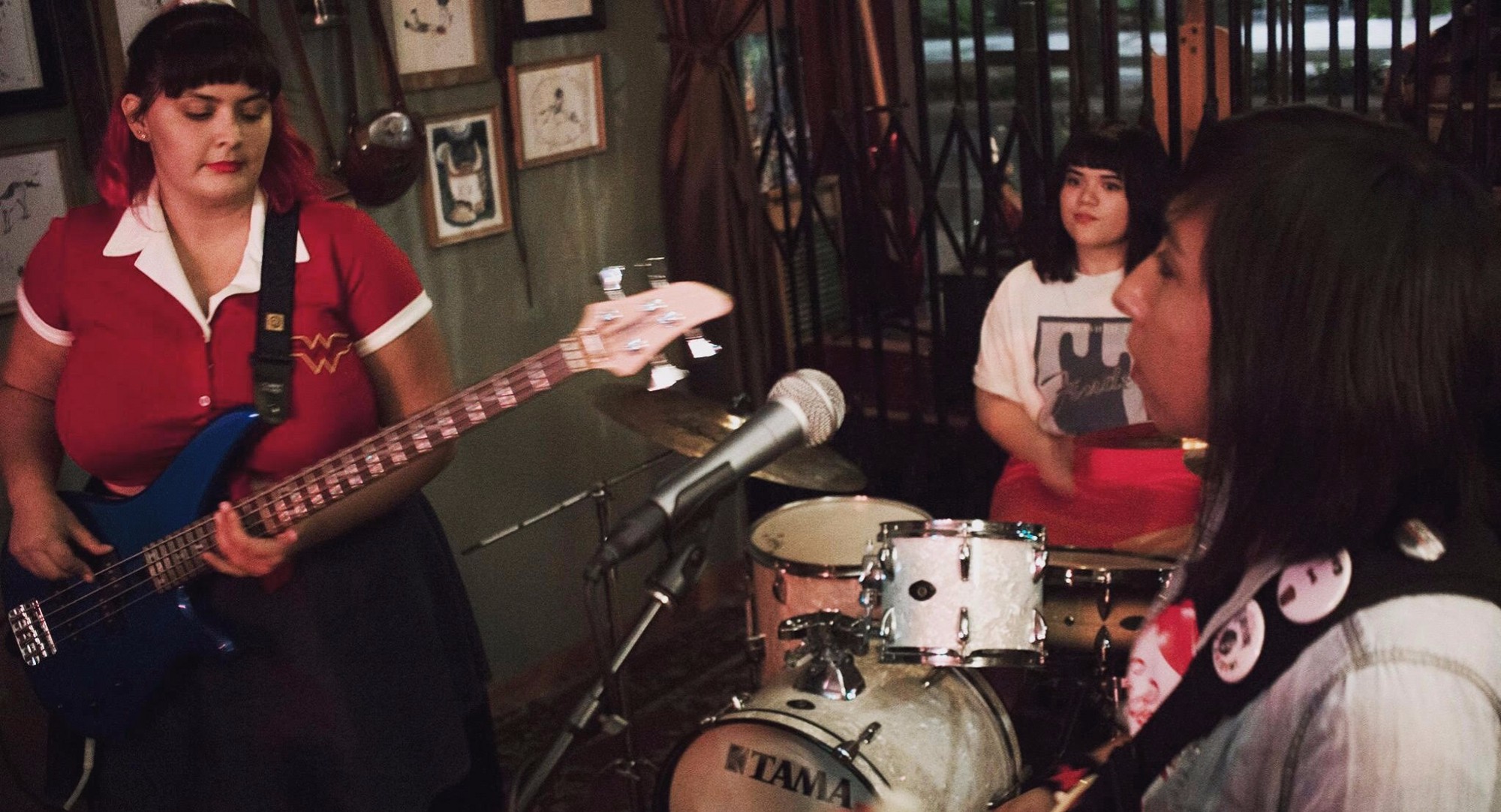It was only a year ago that I was praising the first EP from Orange County’s Storeetellers as “what Juno and Paulie’s band might have sounded like with some electric guitars.” In the course of the next ten months, the band would put out a full-length record — The Royal Baeby — a Christmas single, and videos for “Don’t Hold My Hand,” “Imbecility,” and “La Sancha.”
Then they lost a member, renamed themselves Sallie May and kinda started over. Briana, Bagel, and Lucia were kind enough to talk to me about the challenges and opportunities that came with a shuffling of members, a name change, and how weird it is that “people are still getting used to seeing women play music.”
So let’s start with the name change. Up until recently, you were all in a band called the Storeetellers. What prompted the name change? Do you see it as a greater change for the band?
BAGEL: We’ve sort of been beating around the bush when people ask us this question because we didn’t want to stir up drama, since we already knew that people were talking. To be honest, we wanted to change our name when one of our members left the band. When she left, it just didn’t feel right playing as that band anymore. Although inconvenient, the change was a good idea. It helped make our transition from a four-piece to a three-piece less daunting.
What we were going for with “Sallie May” is just a little bit more focused pop punk, while still keeping that grrl twist. We wouldn’t say this direction is radically different… it’s just slightly more focused and cohesive. It’s awesome because now we’re playing to new audiences instead of staying in our little bubble of friends, and it seems like it’s working so far.
BRIANA: As for the name its self, Bagel suggested something “school themed” since we’re all in school and school is something everyone can relate too, but we didn’t want it to be something we would grow out of, and we thought…. you never grow out of student loans.
Will you still play Storeetellers’ songs?
LUCIA: We’re going to progressively move away from that material as we song write more and develop more songs, but we’ll still bring them back from time to time and I’m sure we’ll keep a couple “classics” on the set list.
How is it being in a trio versus the foursome? What dynamics have changed?
BAGEL: After our fourth member left the band, we kind of sat around for a couple days and wondered what the heck we should do next. We honestly weren’t used to having to make big decisions as just the three of us. We were sitting inside one of those hydrogen ice cream places that makes really fancy ice cream when we decided we were going to continue as a three piece and “just see what happens.” Things happened a lot easier than we had originally anticipated. The dynamic now is a lot less tense and rigid. We’re all pretty lax people and although we move at a lot slower pace than what we used to with Storeetellers, I feel like this better suits our lifestyle. We’re all students and employees and sisters, so we’re a lot happier now that we move at a much slower pace and take longer to consider and make decisions. There’s a lot more balance in our band and in our lives. It’s a lot less pressure now.
LUCIA: Things are a bit more organic now and we kind of go with the flow of things. I’m also okay with singing a little less than before. As for songwriting, we kind of just go with whoever is on a roll creatively; so if they have a mostly complete song, we just work on it at practice.
BRIANA: Luckily, our music and songwriting works really well as a three piece, we haven’t lost our full sound and we’re able to showcase our talents and strengths. We’re working really well together and we’re just grateful to be jamming, creating music, and having fun!
You are all multi-instrumentalists. So how do you write/select instruments for a particular song?
BAGEL: One of the things we love most about each other is that if one of us wants to play a song on an instrument different from our own, we don’t have to worry about our main instrument because someone else can just pick it up and play it. They way things are going now, whoever writes the song gets to play the guitar, because they probably wrote the song on guitar and it just naturally happens that way. That’s not the rule, but it’s just a trend that we’ve picked up on.
I play a lot more songs on guitar now that I’ve written more songs. That gives Briana the opportunity to play the drums, or when Lucia and Briana switch guitar and bass, it gives Lucia the opportunity to be in the spotlight. I like being versatile in this way because then I don’t feel stuck in my little drum chair all the way in the back all night.
LUCIA: Usually whoever writes the song gets to pick whatever instrument they want to play honestly. The only instrument I’ve yet to play on is drums, but we’ll see. Haha.
BRIANA: Its one of our greatest advantages as a band! With multiple songwriters and multi-instrumentalists, we get to have a cohesive sound without sounding like one long song for an entire set. Like Bagel said, who ever writes the song drives the bus, but we’re always open to each other’s opinions and ideas to make our songs as dynamic as possible.
One thing that really stood out to me on the Storeetellers’ “The Royal Baeby” was how your songs often change rhythms or incorporate rhythms from different musical genres. It’s something that sets you apart from other poppy / punky bands. I’m thinking of how “Ice Cream” changes from a pretty upbeat rock beat to a syncopated riff right after the refrain. Or how “La Sancha” incorporates ranchera rhythms but then smothers them in dirty guitar. Or even how “Undateable” swings into a half time outro from its really cheery upbeat 4/4 chorus. How do you all approach the rhythms of your songs? Do these inflections come naturally in the writing? Do you work them out as a band to give the songs dynamics?
BRIANA: Its definitely something that happened naturally, with our first album we we’re still exploring our sound and wanted to try out different techniques for all of our favorite types of music. While it is really fun, we’re focusing in on our strengths as musicians and songwriters now. I don’t think we could ever fully let go of our influences from different music styles since its what we grew up on and how we learned, so you’ll still hear those influences in our newer songs.
BAGEL: It’s probably the most weird for me, since the two songs I wrote on the album — “La Sancha” and “Undateable” are polar opposites of each other. “La Sancha” has a lot of complicated polyrhythms and things that are just stylistically more complex, and “Undateable” is just plain cute and simple. It was completely unintentional, and I didn’t realize the weird contrast until we put my two songs back to back on the album.
I guess these two songs are a good representation of how multi-faceted I can be in terms of my musicianship and especially in my personality. I come from a very extensive background of jazz music, which is mildly reflected in the complicated rhythms in “La Sancha.” On the other hand, I really enjoy old doo-woppy tunes because they’re simple and fun and cute, which is what “Undateable” is all about.
We also have the tendency to change styles and time signatures within the songs themselves because us three as musicians come from different style backgrounds, so we basically just threw all those ideas in there so that everyone had their moment. In some cases the meshing of our styles worked better than others. There was a period of time during which every idea was a good idea, which is why our album is just a hodgepodge of various sounds and styles. It may be our biggest strength or possibly one of our biggest weaknesses.
LUCIA: For me personally I feel like rhythms are a bit of an afterthought. I just kind of write bass lines that come organically. I actually play by ear so I sit down on my own time, listen to the music, and come up with bass lines that “fit,” well to me at least. But overall each of us has really diverse backgrounds and musical experiences. Bagel is trained in jazz and also plays the trumpet in “La Sancha,” while Briana is currently getting her master’s degree in music composition. I have more of a background in 90s punk and pop punk. So I think the diversity in our musical backgrounds speaks to the diversity in the music that we write and perform, as well as to the rhythm changes you hear in our music.
If I’m going to mention rhythms, I guess I should cover harmonies and vocals as well. You use a lot of “doo wah” (sorry for that description) background harmonies but you also switch lead singers in verses of songs. How do you decide vocal duties? How do you work out those vocal parts?
BAGEL: For us, whoever writes the song ends up singing lead vocal. Again, not a rule, but a trend. For songs like “La Sancha” and “Not Dead Yet” where we switch lead vocals within the song, it ended up being whoever called dibs on what. I wanted to sing the verses during “La Sancha” because I wrote the words, and Briana wanted to sing the Spanish parts because she likes singing in Spanish. In “Not Dead Yet,” that was one of the songs we wrote as a collective unit, so we all sort of had an idea who would sound better singing what. We’re pretty honest when it comes to playing to our strengths. That’s why I ended up singing the cutesy verse and Briana sings the more powerful things.
As far as the harmonies go, I wanted “Undateable” to be like The Beach Boys where these stacked harmonies are just everywhere. I actually wrote the outro to “Undateable” before writing anything else, because I felt like the harmonies really make that song what it is. In terms of building the harmonies, they’re not necessarily assigned, but we kind of have a good idea who would sound best singing what. Like, when I wrote “Undateable,” I gave everyone their harmony parts because I heard their voices in my head when I wrote them.
BRIANA: Again, we like things to be natural. A lot of the time I will naturally the harmonies I hear in my head, and if something is really important we’ll sit down and figure out where the vocals are most effective. Like for “Imbecility” there are three part harmony back ups that play to the “surf noir” sound that is popular nowadays and gives it a creepy vibe (creepy is cool!) I think we use vocals more as an aesthetic rather than a foundation. If backgrounds and harmonies aren’t adding to the song, then they’re not necessary. But sometimes they just sound dope as hell!
LUCIA: Also when it comes to harmonies, Briana’s music composition background is super helpful because she knows what notes actually work together, and then we usually work out those harmonies at practice.
How have you done most of your recording so far? Self-financed? Home studio?
LUCIA: We’ve already put out an EP “Kiss Your Frogs, Hug Your Boos” and an full-length album called “The Royal Baeby”. Both recordings were put out under the name Storeetellers. We did all that work in less than a year after the band formed and it was pretty intense actually. Haha. But we got a really good deal through a friend of the band and we were able to record both of them at Musician’s Institute. We recorded the bulk of “The Royal Baeby” in an overnight recording session and by the time we left the studio we watched the sun come up.
BAGEL: It was my very first time recording and I was just like, “oh, not everyone gets to record like this?” Haha. So I’m spoiled now! We actually got a really good deal on that and recorded the album for next to nothing. We just got lucky that he was willing to record us for cheap. There’s a bonus track on the album, “Buh-Bye” that was recorded by our friend Luke Johnson from Roosterhead. That was recorded in his garage in a couple hours, and then we bought him a pizza afterwards.
BRIANA: We’re very fortunate and grateful that our friends have believed in our music and presented us with the opportunity to record with them. Honestly as a DIY band we’d be nowhere without the support of our community.
For a young band, you’ve been really prolific — 3 singles and a full-length in less than two years. Are recordings really important to you as a band? Do you have plans for the next release already?
LUCIA: Recordings are really good initially when you’re just trying to get yourselves out there as a band; that way people have something to walk away with at a show. I think at this time though we’re really just going to focus on writing new song material, but we’ll probably put out a single sometime over the summer of 2016, just so you don’t forget about us. Haha.
BAGEL: All of our previous recordings were sort of rushed and last minute. I remember going in to record “Buh-Bye” and being like, “Uh, how does this song go again?” and I was literally making up the parts as I was recording them. We also recorded our whole album in, like, two all-nighters with one or two takes per song, instead of the several days that we should have spent on it. I always felt awful about my performance during “Undateable” because it was the last song we recorded our first night — it was 4 AM and I had just crashed from a caffeine high after drinking an entire gallon of double shot espresso, so I just wanted to get it over with. Everyone was like, “Hey Bagel, wake up, it’s your turn now.”
BRIANA: I agree with Bagel on the fact that we did rush, but the same with Lucia that it felt necessary to have something out there to let people know we exist. Right now we’re working on developing our sound, really being hammering out our individual parts and practicing together to be really cohesive and “in the pocket” we’ll start planning our next album once we feel really confident in all of our songs. But for now we’re gonna enjoy playing new shows.
You’ve made a couple of really great videos. How have they helped you get your music out? Or are they just fun to do? Do you think they’ve been “successful” in those respects (getting music heard or just having fun)?
LUCIA: Music videos are a great promotional tool and we’re lucky enough to have had two band mates that could actually film and edit it themselves. All the videos are completely DIY, from the backdrops, to the friends we casted to be in them. We have a video called “Imbecility” where believe it or not, at some points there was no one behind the camera. We just set up the camera on a tri-pod and hit record (just a random fun fact)! It came out pretty well overall.
BRIANA: Our videos are definitely for fun! Some of it just playing out our own personal dreams, (like eating human hearts and kissing our friends lol) Our hardcore “fans” enjoy our videos but it definitely hasn’t opened doors for us yet.
BAGEL: Our videos were all done on our own. I’m a film student and I make a lot of videos in general, so I feel like making these kinds of videos are mostly just for fun. Sadly, I sort of feel like the music video is dying in today’s music culture. People want music like they want fashion… fast and not much of an investment. It’s hard to get people to watch a three minute video these days, and it kinda sucks, but I feel like we’ve been more successful getting our music out in different ways, like playing shows and getting on the radio. But I still think videos are important to have for those people who actually take the time to watch them.
I’ve struggled to find a good way to talk about the political actions of the band — whether it’s playing feminist shows or having an LGBTQ story in a video. So I thought I’d open that topic up to you to say whatever you like. A lot of bands with punk instincts play pop music and struggle to define that line between fun and activism. You seem to do a great job of just plowing right through that line. How deliberate is that? Or is there anything you’d like to say about it?
BAGEL: We’ve been involved with the LGBTQ community as long as we’ve been a band, and we tend to not stray far from it. So whenever we do play a show where people still have backwards ideas about women in music, it does kind of throw me for a loop. Sometimes I forget that people are still getting used to seeing women play music.
I hope that someday there’s no longer these separate worlds of “girl bands” playing with other girl bands, while the dude bands continue to play with dude bands. We once played a show and on their roster was, “Thursday: Two GREAT bands! Friday: Four girl bands,” and it was the funniest thing ever. I wish there wasn’t such a thing as “ladies night” where they give just one night to the LGBTQ community and the rest of the nights are just run by straight white dudes. Mind you, I think ladies’ night is rad and having everyone together is an awesome support system, but hopefully someday we can all just play together with no gender divide.
LUCIA: I think what helps with us being able to bridge the two is that we’re not your typical band, I know that sounds cliché. We take pride in being good musicians, but we also like to have fun. I think the activism is also something that is just a part of who we are as people. Even when we aren’t writing and performing we also do a lot of volunteer work. Last summer some of us volunteered with Rock Camp for Girls as instrument instructors. So it is kind of cool to have band mates that are involved on an activist and social-awareness level. It makes us more than just “the music.”
BRIANA: Our mere existence as female/PoC/queer allied musicians is an act of activism in itself. I often forget how “progressive” we are because we’re being ourselves and standing up for our beliefs. I think if people like us were more of the “norm” in the music scene we wouldn’t be as much of a novelty. We can’t really help but be activists since we have to fight for our own space in the music scene. Like being an all girl band eventually became the only option for me since I have been in bands with boys and they were always jerks and mean to me and didn’t let me doing things just because I was a girl. And that goes for shows as well, there have been venues that don’t take us seriously simply because we’re girls, and have also been unsafe for us. I’ve been to shows where the bookers have said inappropriate comments and been very forward, they definitely don’t act that way with boy bands. So playing other shows with all girls helps create that literal safer space. Hopefully those type of environments change as awareness grows. Also we definitely want to support other women to play music, and the best way to do that is walk the walk.
Where can everyone find you next?
Our next show in June 11th at The Center in Santa Ana for “Grrrls To The Front.” We’re only playing 1–2 shows a month right now since we’re writing new material. Hopefully we’ll have a new single out by the summer!
Find Sallie May on Bandcamp, Facebook, Twitter, Instagram, YouTube and all over Southern California. (They’re on Spotify and iTunes as Storeetellers.)












































Comments
No comment